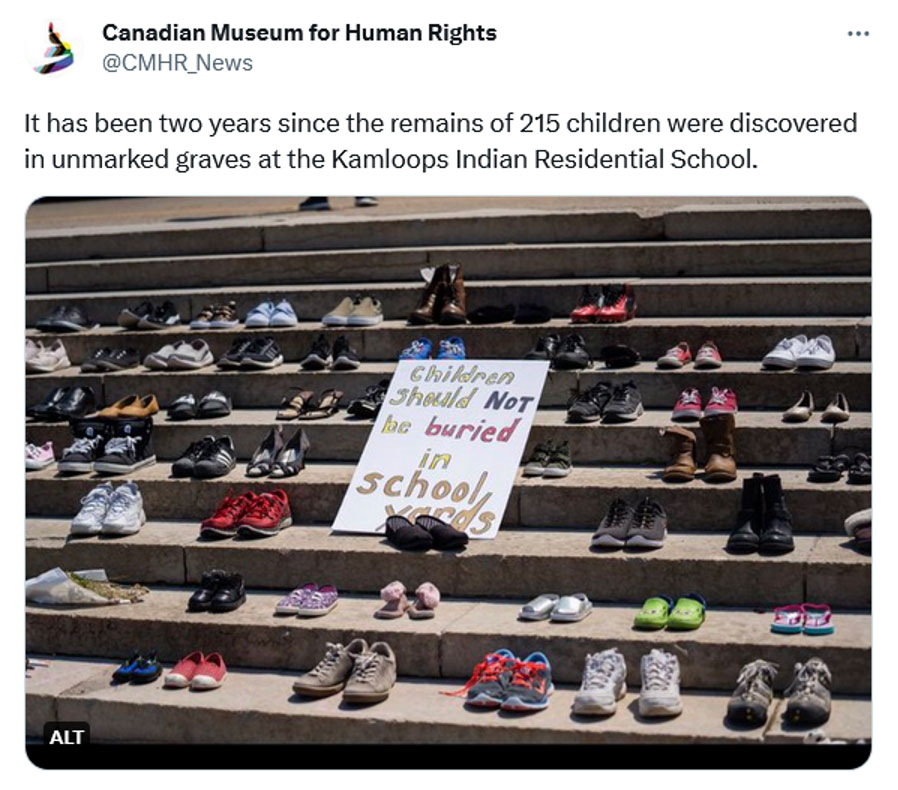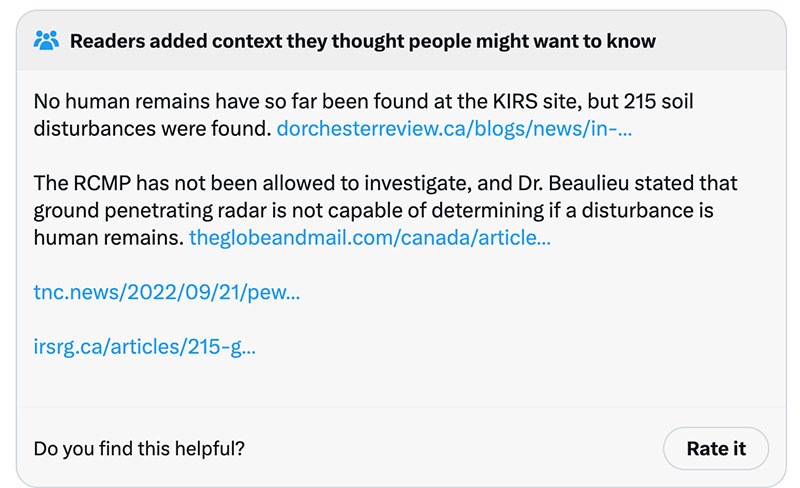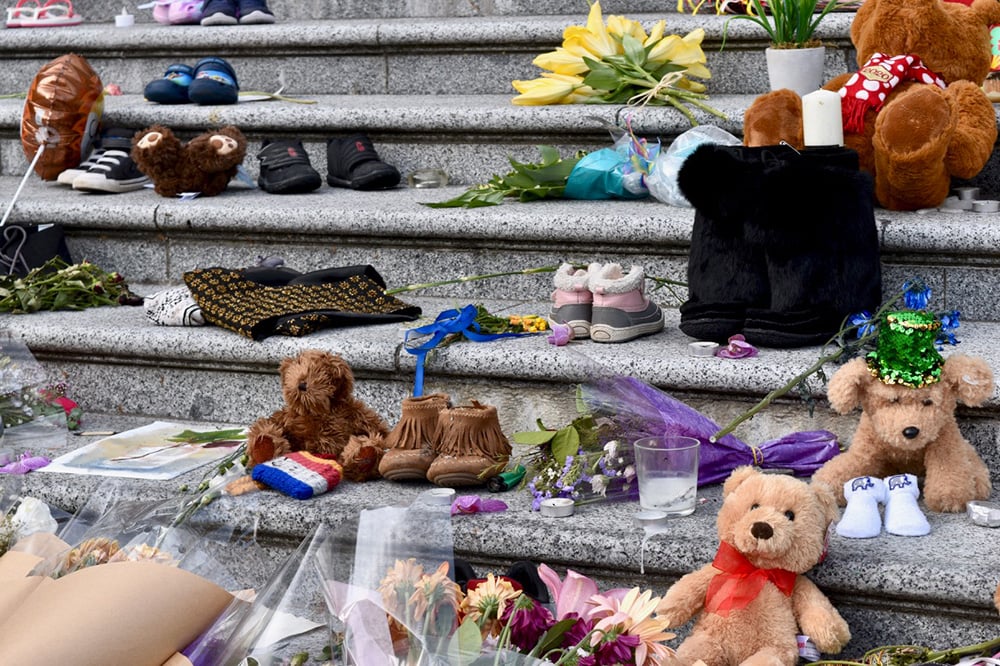May 27, 2023 marked the two-year anniversary of the Tk'emlúps te Secwe̓pemc’s announcement about the location of 215 potential unmarked graves at the former Kamloops Indian Residential School in the Interior of British Columbia.
In recognition of the anniversary, the Canadian Museum for Human Rights, located in Winnipeg, Manitoba, used its Twitter account to post a series of tweets — viewed by almost two million users — in support of Indigenous communities searching for unmarked graves at former Indian residential school sites across the country.

One of the museum’s tweets, however, mistakenly stated that “the remains of 215 children were discovered in unmarked graves” at the school. This is not entirely correct. The Tk'emlúps te Secwe̓pemc explained in its May 2021 press release that the findings were preliminary.
It is true that the release contained this statement: “This past weekend, with the help of a ground penetrating radar specialist, the stark truth of the preliminary findings came to light — the confirmation of the remains of 215 children who were students at the Kamloops Indian Residential School.” However, the ground-penetrating radar technology used only identified soil anomalies, confirming prior community knowledge about potential remains at the school.
At the time, the nation made clear that “we have more questions than answers” and stressed that additional research and community consultation was needed.
In subsequent communication, the nation has referred to the findings as the confirmation of “the likely presence of children, L’Estcwicwéý (the Missing) on the Kamloops Indian Residential School grounds.”
Research is ongoing, and the Tk'emlúps te Secwe̓pemc recently announced it has decided to exhume the site.
The nation is taking its time to ensure the process is done in culturally appropriate ways focused on reducing further trauma and facilitating community healing.
The Canadian Museum for Human Rights' small but significant error — human remains discovered vs. research confirms local knowledge about potential remains — thus opened the door for residential school denialists.
The work of denialists is insidious; it can be difficult to immediately detect, but it has harmful effects. Residential school denialism is not the outright denial of the existence of residential schools. It’s not even a refusal to acknowledge that harms and abuses occurred. Rather, like other kinds of denialism, it attempts to twist, downplay or minimize established facts and survivor accounts.
This has the effect of discouraging survivors from sharing their truth, undermining public confidence in reconciliation and protecting the colonial status quo and guilty parties.
As journalist Michelle Cyca recently argued in the Walrus, many have taken their discomfort about the news of potential unmarked graves “a step further by insisting that there must be another version of events, an alternative history of residential schools” that absolves them of responsibility and justifies their lack of support for reconciliation.
Putting truth before reconciliation today requires a better understanding of how to identify and confront the emerging phenomenon of residential school denialism.
By showing how the Canadian Museum for Human Rights’ mistake was manipulated by denialists to spread misinformation, we hope to encourage people to speak about this important issue from an informed position that won’t cause further harm to survivors still struggling to have their truths recognized.
Denialism is a barrier to reconciliation
According to church and state records collected by the Truth and Reconciliation Commission, Canadians definitively know that more than 4,000 Indigenous children and youth died in residential schools across Canada between the 1880s and 1990s. The National Centre for Truth and Reconciliation has already confirmed 51 deaths at the Kamloops school.
Nevertheless, due to a lack of co-operation and access to complete records by government departments and churches, the TRC called for further research to determine whether additional deaths may have occurred.
Responding to the TRC’s Calls to Action 71 to 76 about locating potential unmarked graves, the Tk'emlúps te Secwe̓pemc’s work, like similar searches being undertaken by First Nations across Canada, is ongoing.
Searching for possible missing children and potential unmarked graves at former residential school sites is important but difficult, heart-wrenching work.
Polling shows that the majority of Canadians support Indigenous nations undertaking such searches and are respecting their efforts to learn the truth about their loved ones to better facilitate healing, justice and meaningful reconciliation.
There is a small number, however, who choose instead to engage in residential school denialism to prevent that healing, justice and reconciliation by writing hurtful op-eds and social media posts or even sending threatening messages via email or telephone.
Some have gone so far as showing up to the Kamloops site with shovels, saying they “wanted to 'see for themselves’ if children were buried there.” An alleged serial killer in Winnipeg shared residential school denialism on his social media accounts at the time he was targeting Indigenous women.
As a result, Kimberly Murray, the independent special interlocutor for missing children and unmarked graves and burial sites associated with Indian residential schools, has identified the increase in violent denialism as one of the 12 common concerns raised by survivors and communities in their work.
Murray Sinclair, the TRC’s chair, has stressed that Indian residential school denialism is one of the biggest barriers to meaningful reconciliation. Without truth, there can be no genuine reconciliation.
Fighting for the truth
The battle for truth was on full display with the Canadian Museum for Human Rights’s tweet. The museum’s mistake opened the door for residential school denialism, as some pounced on the error and used it as a wedge to promote a conspiratorial counternarrative that suggests searches for unmarked graves are fake news, a “hoax” and a big lie being deliberately spread to denigrate churches and destroy Canada.
On Twitter, the museum’s tweet allowed denialists to mobilize their followers to manipulate the social media site’s tools to “correct” the error by including additional context.
Unfortunately, the context added included links to far-right websites created by non-experts and that promote residential school denialism. The “added context” was later removed when it was identified by users as misinformation.

Other commentators jumped on the controversy to write their own articles to rehash denialist talking points (e.g. deaths are overblown, unmarked graves are normal, students are to blame for abuses, etc.) by controversial figures with no credible expertise on residential school history.
Canadians in favour of reconciliation must take these attacks on truth and survivors seriously. We must learn how to effectively identify and confront residential school denialism before it takes root.
Challenging denialism is an opportunity
The TRC was clear that reconciliation is not an Indigenous burden but a Canadian responsibility — and an opportunity to build stronger relations with Indigenous peoples.
Part of this work is exposing denialists and the strategies they use to obscure facts and spread harmful misinformation. It also involves taking great care to avoid errors in messaging and information surrounding residential schools. Precision is an important part of putting truth before reconciliation.
It remains crucial for all Canadians to challenge residential school denialism, denouncing and discrediting it at every turn.
This is a concrete way to support reconciliation. It’s a way of honouring survivors and extending compassion and solidarity to Indigenous peoples as they carry on with searches for potential unmarked graves at former residential school sites across Canada, and help this country uncover the truth of what happened in these institutions. ![]()
Read more: Indigenous, Rights + Justice, Media
















Tyee Commenting Guidelines
Comments that violate guidelines risk being deleted, and violations may result in a temporary or permanent user ban. Maintain the spirit of good conversation to stay in the discussion and be patient with moderators. Comments are reviewed regularly but not in real time.
Do:
Do not: